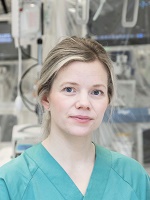Due to copyright reasons, an electronic copy of the thesis must be ordered from the faculty. In order for the faculty to have time to process the order, it must be received by the faculty no later than 2 days prior to the public defence. Orders received later than 2 days before the defence will not be processed. Inquiries regarding the thesis after the public defence must be addressed to the candidate.
Trial Lecture – time and place
See Trial Lecture.
Adjudication committee
- First opponent: Professor Karim Brohi, Centre for Trauma Sciences, Blizard Institute, London
- Second opponent: Docent Anna Ågren, Institutionen för Molekylärmedicin och Kirurgi, Karolinska Universitetssjukehuset, Stockholm
- Third member and chair of the evaluation committee: Associate Professor Anders E.A Dahm, University of Oslo
Chair of the Defence
Professor Anne Margarita Dyrhol-Riise, University of Oslo
Principal Supervisor
Professor Torsten Eken, Faculty of Medicine, University of Oslo
Summary
Trauma victims face a considerable risk of death even if they reach hospital alive. This is in part due to detrimental systemic inflammation and trauma-induced coagulopathy that may lead to dysfunction of organs that were not initially injured. The main goal of this research effort was to generate high-resolution observational data to describe the concentration and activity kinetics of key molecules reflecting the state of inflammation and coagulation. We aimed to investigate if there were statistical relationships between our observational data and the degree of injury as well as outcome measures in terms of remote organ failure and survival. In a unique series of 1094 blood samples from 136 patients with a broad spectrum of injuries and outcomes, we have described in detail the kinetics of five important molecules during the first hours and days after injury. Our kinetic findings were linked to clinical data from the Oslo University Hospital Trauma Registry. We found that common for complement activation, procoagulant activity of extracellular vesicles, thrombin generation in plasma, and anti-fibrinolytic activity, is that there is an exaggerated response during the first few hours after injury and that the response remains high for several days. The magnitude of this early response is statistically related to anatomical injury severity, physiologic derangement, and remote organ failure. Knowing the concentration kinetics for these molecules is useful when designing future experimental and interventional studies in search of therapeutic targets to ameliorate systemic inflammation and multiple-organ dysfunction.
Additional information
Contact the research support staff.
